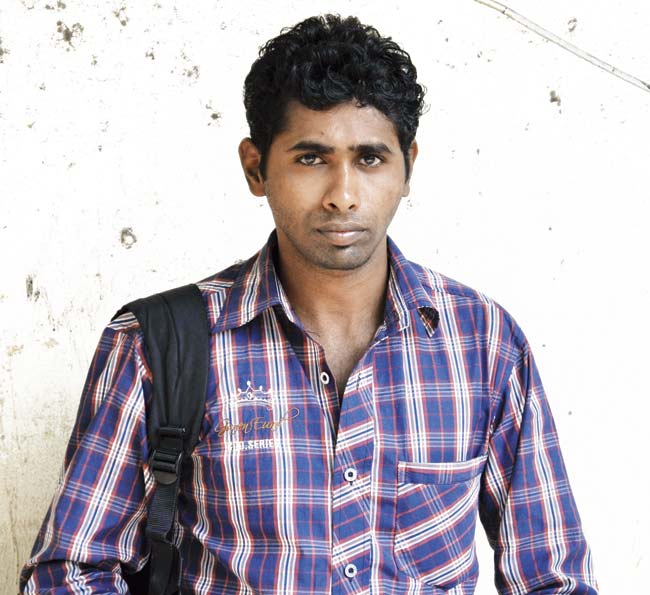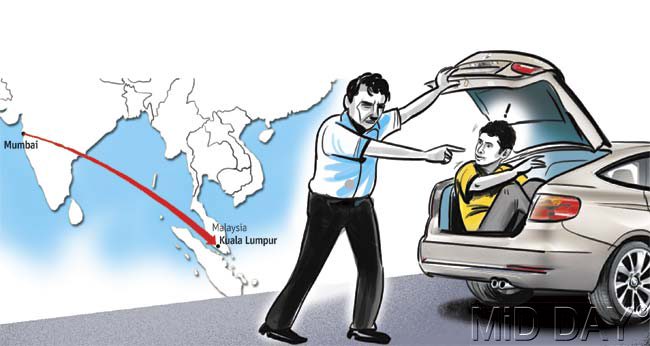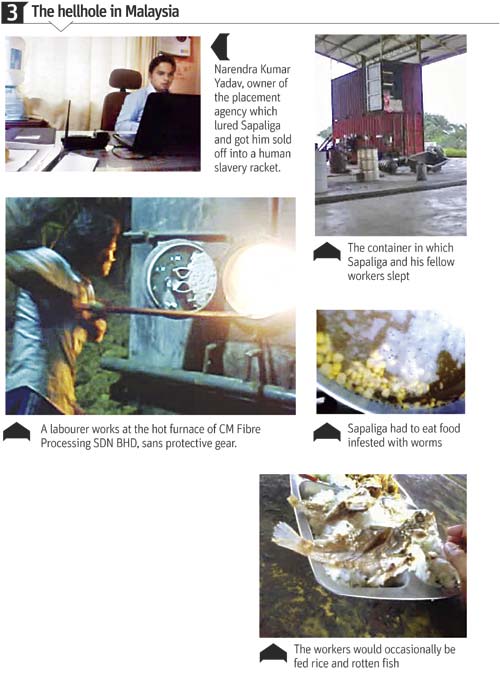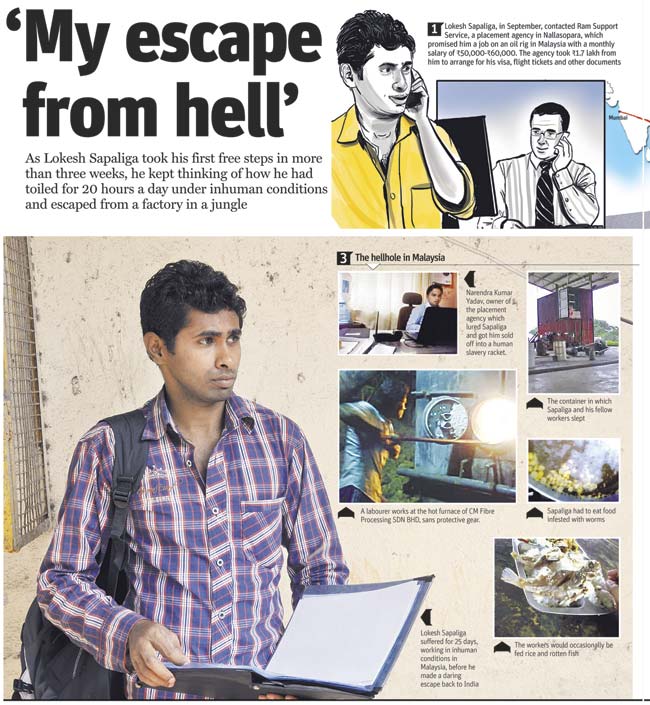The Harrowing Story Of How Two Indian Nationals Escaped From Slavery In Sibu
27-year-old Lokesh Sapalinga's escape has become an inspiration for the hundreds of migrant workers who were allegedly duped and forced to work in inhuman conditions at an oil palm plantation in Sibu, Sarawak.
An Indian national's harrowing escape from a "human slavery mafia in Malaysia" reported by Indian online daily Mid-Day has ignited into an international controversy about Malaysia's human trafficking record
An Indian national has recalled a harrowing experience of modern day slavery in Malaysia, working in squalid conditions in a Sarawak factory and paid a salary of about RM20, in what could highlight yet again Malaysia's human trafficking record.
Lokesh Sapalinga, 27, was looking forward to a career in Malaysia. His agent in Mumbai promised him a good job on an oil rig in Kuala Lumpur with a handsome pay of Rs 50,000 to Rs 60,000 (RM2,700 - RM3,300).
Sapaliga’s ordeal began in September, when he chanced upon a job posting on a classifieds website. He had then been working in the Gulf as an electrician. The ad, posted by one Ram Support Service, a placement agency based in Nallasopara, promised a job on an oil rig in Kuala Lumpur. The owner of the agency, Narendra Kumar Yadav, promised the Andheri resident a handsome pay of Rs 50,000 to Rs 60,000. Lured by the money, Sapaliga quit his job and came to Mumbai to speak to Yadav.
mid-day.comSapalinga paid Rs 170,000 (RM9,200) in agency fees for the agency, Ram Support Service, to arrange his departure and secure a placement. On 19 September 2014, he trustingly boarded a plane to KL.
“Yadav took Rs 1.7 lakh from me to arrange my visa, flight tickets and the continuous discharge certificate (CDC, a document required for someone who works on-board a ship). I boarded a flight on September 19 for Kuala Lumpur. My visa had a proper stamp stating I was going to work on a ship, so there was no question of casting doubts upon the offer,” recalled Sapaliga. Unfortunately, there was.
mid-day.comHowever, Sapalinga's vision of a bright future soon tarnished as soon as he landed in Malaysia. A man who claimed to be his sub-agent stuffed him into the boot of a car and allegedly sold him off to "the Malaysian human trafficking mafia"
After reaching the Malaysian capital, Sapaliga met one Rajkaran Verma, a sub-agent, who stuffed him into the boot of a car and sold him off to the Malaysian human trafficking mafia.
mid-day.comHe was brought to CM Fibre Processing Sdn Bhd, an oil palm factory in Sibu, Sarawak. The Mumbai daily reported that Sapalinga's flight landed in KL but did not detail how he was brought all the way to Sibu.
The report, published yesterday, did not detail how Sapaliga arrived in Sibu, a major town in Sarawak over 1,000km away from Kuala Lumpur, and separated by the South China Sea.
A check online showed CM Fibre to be a Sibu-based factory set up in 2007 to convert palm oil waste into raw fibre for export. It is a subsidiary of the Sri Minyak Group Bhd, which was established in 1986, and had dealt with oil and gas giant, Shell in Sarawak for over 26 years.
Sapalinga told of horror stories from the oil palm factory in the middle of a jungle. He worked 20 hours a day for a meagre wage, slept in overcrowded shipping containers, ate worm infested stale meals, and had no medical aid. He had proof of all these allegations.
“We worked for 14, 18 and even 20 hours a day for a paltry sum of Rs 400. My hands and legs used to go numb from exhaustion. Slaves who dared to complain were thrashed by the factory guards,” he recalled. In the few hours of respite workers got, they were accommodated in shipping containers.
mid-day.comEach ‘room’ had one fan, and 15-20 men competed for the little breeze that it threw their way. The mattresses were infested with bedbugs, and with a welding unit adjacent to the containers, it was nearly impossible to get any sleep. “We were also made to work night shifts without prior notice,” he added.
mid-day.comSapaliga told mid-day that they were fed rice and sabzi three times a day, but it was never enough. Moreover, these were stale meals, with worms competing for the food on the plate. The plates were also never washed.To break the monotony, they would be served rice and rotten fish. But, everybody ate without complaining, for they wouldn’t get any food if they did. Sapaliga also says there was no safety equipment or access to medical facilities. “Slaves who worked near the furnace had no helmets or safety gloves. As a result, many got injured but there was no medical help.
mid-day.comAfter 25 days of slavery, Sapalinga got his break when he managed to bribe some men to make a phone call to his brother-in-law in Mumbai. Prakash Karkera immediately met Sapalinga's agent, Yadav, for Sapalinga's safe return to India.
Sapaliga worked in the fibre-processing unit from September 25 to October 20. Realising that he wouldn’t last long there, with great difficulty, he bribed some men and made a phone call to his brother-in-law, Prakash Karkera, in Mumbai. On hearing of his kin’s suffering, Karkera landed straight at the office of the placement agency located in Solan Amit Shopping Centre, Nallasopara. The owner, Yadav, assured Karkera that his brother-in-law would be safe and back to India soon.
mid-day.comYadav assured Sapalinga's release, but threatened to kill him if Karkera went to the police or the media
“Yadav threatened me that if I went to the police or the media, he would get Lokesh killed with the help of his connections in Malaysia,” Karkera told this paper. However, the family continued to pressurise Yadav to bring Lokesh back, issuing threats of police complaints. It worked.
mid-day.comBut before Sapalinga was allowed to escape, he was made to sign an agreement stating he held no grouse against the placement agency. On 21 October, he ran away in the dark of the night.
Verma, the Indian sub-agent, called up Sapaliga and told him they couldn’t do much until he fled from the factory. Caught between the devil and the deep blue sea, Sapaliga took the risk and, in the wee hours of October 21, escaped from the unit while others were asleep. “The factory is surrounded by a jungle. It was pitch dark and I somehow reached the highway, where I met Verma and his two associates. They had my passport and visa. Before I left for the airport, they made be sign an agreement stating that I was offered the job I desired by the placement agency and that I held no grouse against them.
mid-day.comI had to sign the document, or else they would’ve torn my passport and visa,” he said. The men dropped him to Sibu airport, from where he took a flight to Kuala Lumpur. A day’s halt later, he boarded a flight to Mumbai. On November 5, he lodged a complaint with the Nallasopara police. He had also clandestinely managed to document his experiences on his cellphone camera.
mid-day.comFour days after Sapalinga's story was told, another Indian national who was inspired by him managed a brave escape from the very same factory
Inspired by Lokesh Sapaliga’s flight to freedom, another Indian has managed to get away from the clutches of the human trafficking mafia in Malaysia. But, he bears grim news there are two dozen Indian seamen trapped in a factory, who are being made to toil in inhuman conditions, without proper food or accommodation.
mid-day.comSapaliga’s escape had given everybody hope. On Friday morning, Singh decided enough was enough. Like Sapaliga, he waited till everyone was asleep. It was raining cats and dogs, and the factory is in the middle of a jungle. Against all odds, with a broken hand, Singh climbed a hill in pitch darkness and reached the other side. He managed to hail a bus and reached a friend’s place 500 kilometres away from the factory.
mid-day.com22-year-old Narender Singh was also attracted by the promise of a lucrative salary working aboard a ship. He managed to escape the factory, but is now stuck at a friend's place as his passport and visa is with the agent who has gone missing.
Like Sapaliga, Singh, too, was attracted to the ‘job’ by an advertisement promising a good salary for working aboard a ship in Malaysia as a seaman."I got carried away by the offer. He told me that I would get R20,000 to R30,000 a month. I paid him Rs 1.50 lakh for his services.”
mid-day.comNow, Punjab-based Narender Singh (22), about whom Sapaliga had spoken, has also managed a brave escape. He, however, is at a friend’s place in Malaysia and hasn’t been able to come back to India. Sapaliga had managed to capture Narender’s plight on his phone camera.
mid-day.comMy passport and visa are with the agent (Prabhat) and he is nowhere to be found. I have to go to the Indian embassy in Kuala Lumpur, but the only way I can go there is by flight,” he rued. Singh says Bhupender is also ignoring his phone calls. He has learnt from other fellow workers that Prabhat has left for India. Once he is back, Singh hopes to collect his documents to return to India and get his hand which is still broken treated. Meanwhile, the police have not made any efforts to trace the agents.
mid-day.comSingh sang the same tune as Sapalinga. The guards, built like bouncers, would beat them up; the supervisors would torture them in the middle of the night; they survived on rotten and stale food...
“They have guards who are built like bouncers. They beat us if we fail to report to work. I have been surviving on rotten and stale food for the last three months. They have thrashed me on several occasions. The supervisors torture us labourers in the middle of the night. They walk into our rooms, ask us to wash utensils and clean our rooms just to harass us,” Singh recalled. Workers were made to slog for 18 hours a day in unsafe conditions. One day, Singh had a terrible fall from the top of a furnace and fractured his hand. Instead of helping him, the guards kicked him saying he had purposely done so to play truant from work.
mid-day.comToiling through the inhuman and unhygienic conditions were hundreds of other labourers like them, mostly from India and Nepal
Sapaliga was shocked to see hundreds of labourers toiling in unhygienic and inhuman conditions for almost the entire day. Most were from India and Nepal; he was now one among them.
mid-day.comAccording to Singh, a native of Noor Purvedi village in Ropar, Punjab, more than 24 Indian workers are trapped as slaves in the factory. All of them were lured with the promise of a seaman’s job on a ship. “The youths have come from Delhi, Haryana, Uttarakhand, Uttar Pradesh. Apart from Indians, there are several youngsters from Myanmar as well,” he stated. “There is a constant influx of workers. Most of them are promised a job on a ship, but end up in the slavery racket,” he added. “I am happy to escape, but I have nowhere to go now.
mid-day.comThe Malay Mail has contacted CM Fibre managing director Johnson Tiu who had defended the company with claims of his former workers eager to return
The management of Sibu-based CM Fibre Processing Sdn Bhd told Malay Mail Online that it was horrified by the news report, and cast doubt on the veracity of the allegations, claiming instead that some of the foreign workers it had employed were seeking to return. “The news is too bad... So sad to see this,” CM Fibre managing director Johnson Tiu said in a series of text messages with Malay Mail Online over the weekend.
Defending his company, Tiu forwarded Malay Mail Online screenshots of text message conversations between himself and another worker from India, whom he claimed was eager to return and work with him. “Take a look at the message from my Indian crew. If my place is bad and I am a bad person, then why do they seek to want to return?” he asked, referring to his employees from India. “If he didn’t know about my place, why did he want to come here?” Tiu added, this time referring to Sapaliga.
Tiu suggested that the problem is with the Indian recruiter, but did not explain the allegation of inhuman conditions at the factory
Tiu, who was abroad in Japan when contacted, suggested that the problem stemmed from issues between the worker and the Indian recruiter. “The biggest problem is the Indian worker [got cheated] by the agent and work in place that they [sic] don’t like. [They are] working for the air ticket to go back to their hometown,” he said.
Tiu however did not explain how the Indian agents were responsible for the allegedly atrocious conditions in his factory, which included cramped accommodations in shipping containers, and lack of safety gears and medical facilities.
Before he escaped, Sapalinga managed to record proof of the inhumane conditions forced on him by using his camera phone. The video can be seen here.








